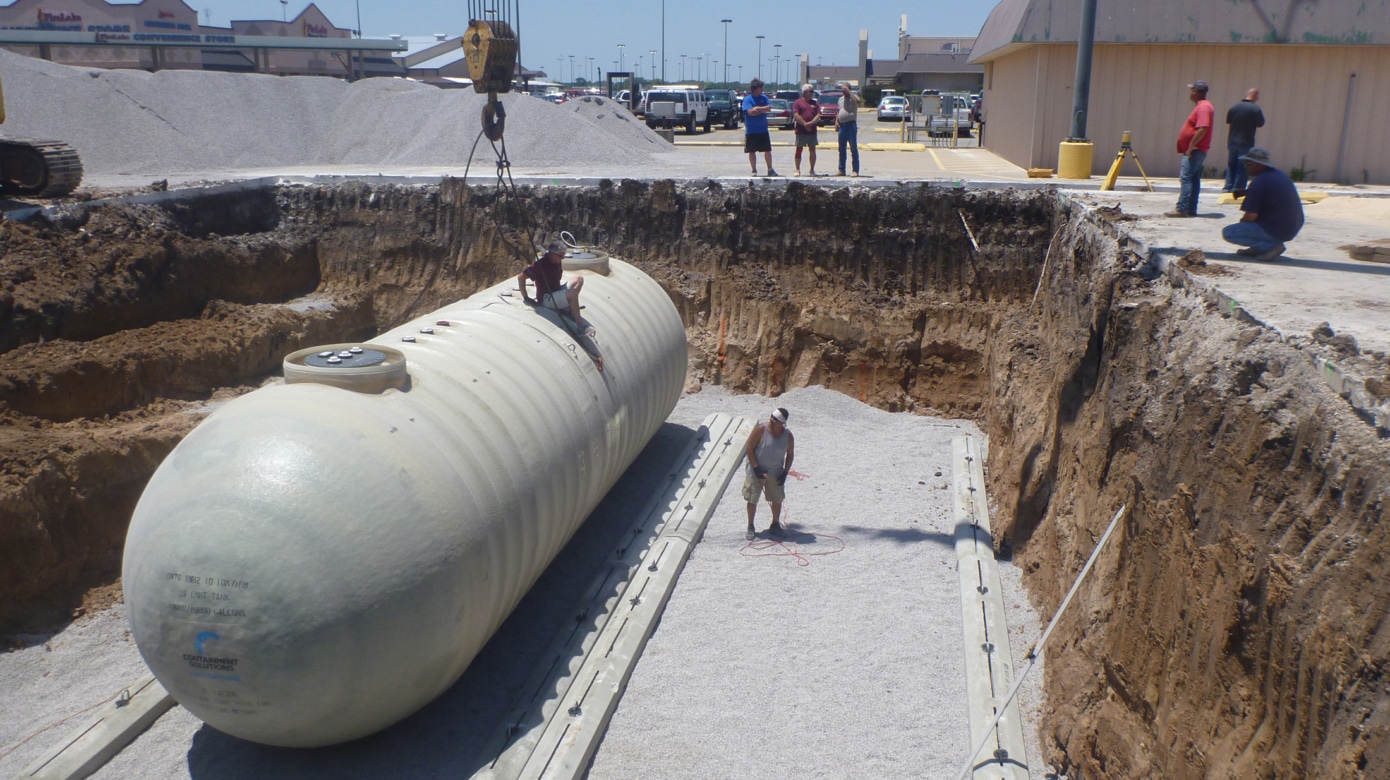A part of the Natural Resources division, the Citizen Potawatomi Nation Department of Environmental Protection (CPN DEP), works to ensure the Tribe’s departments, enterprises and infrastructure operate at the safest, most economically sound and ecologically responsible level possible. Though often working behind the scenes, the small but dedicated staff is responsible for critical operations that protect the Nation, the environment and the community.
Environmental Specialist Bryce O’Connor manages the everyday operations of the underground storage tank (UST) compliance assistance programs. Assistant Environmental Director Micah Isaacs oversees the UST, recycling and water programs for the Tribe as well as the grants that fund them.
Underground storage tanks
USTs are storage tanks where fuel is stored, in this case, at gas stations, and include a complex system of piping and machinery that carries the fuel to the dispensers where patrons fill their vehicles. Oversight and upkeep of these tanks is critical to the health and safety of gas station employees and patrons, the protection of groundwater in the area, and the revenue stream of the Tribe.
“We help to ensure that all the Citizen Potawatomi Nation’s gas stations are following protocol and keep running right, not harming the environment around us and keeping everything as safe and clean as we can,” O’Connor said.
CPN operates three gas stations: the Grand Travel Plaza, FireLake Corner Store across the street from Tribal headquarters and FireLake Express in McLoud, Oklahoma.
O’Connor inspects each facility monthly and examines the tanks at the Grand Travel Plaza more frequently due to its proximity to waterways in the area. A graduate of the University of Oklahoma with a degree in environmental science, O’Connor is driven by his appreciation for nature and his desire to preserve and protect it.
Inspections involve examining the visible parts of the fuel system, including parts of the USTs and the dispensers. An Automatic Tank Gauge — “the brains of the operation,” according to Isaacs — monitors the invisible parts of the system through frequent statistical analysis of pressure in the tanks, lines and dispensers.
By maintaining compliance with regulations set by the Environmental Protection Agency for the operation of USTs, CPN reduces the risk of leaks, spills or other malfunctions that could cause contamination of surface or groundwaters.
Emergency preparedness
In addition to inspecting facilities for proper function, O’Connor also trains frontline staff in spill prevention and response protocols.
Employees in any position handling fuel transactions are required to achieve a Class C UST operator certification within 30 days of hiring.
O’Connor highlights the critical points throughout the fuel system where leaks or spills might happen, location of shutoff switches and the importance of shutting off the pump system as soon as a leak or spill is detected. He also explains the emergency call tree for response and reporting that must take place after a spill.
“My philosophy, and what I’ve tried to impart on my staff, is we want to be proactive, and we want to make sure that we’re taking care of business in front of it instead of responding on the back end,” said Director of Transportation and Environment Shawn Howard. “We have learned this through experience. It’s better to get everyone on the same page and know who is responsible for what, in case something happens.”
Sovereignty and success
Howard explained that the Tribe is a co-regulator with the EPA when it comes to UST safety and compliance. This means that CPN’s facilities are regulated internally instead of by state agents — a critical aspect of tribal sovereignty, Isaacs emphasized.
CPN partners with other tribes in the area through the Inter-Tribal Environmental Council to coordinate with the EPA and share best practices. Established by the Cherokee Nation in 1991, ITEC provides support, training and environmental services to member tribes across Louisiana, New Mexico, Oklahoma and Texas across a number of areas, including UST compliance.
The EPA uses CPN facilities as models for training at other sites, both tribal and non-tribal, and has asked the Nation to present at EPA trainings throughout the years. In 2008, CPN was awarded the EPA Region 6 Award of Excellence for UST compliance out of the 66 tribes in the region.
“That says a lot about how well the stores are managed and how much they take these matters seriously,” Howard said. “We’ve never had a finding during any EPA inspection of our facilities.”
The team feels that Tribal administration and enterprise managers support their role in ensuring the safety for all and protection of the environment. In addition to environmental damage, leaks and spills would have an economic impact if a facility became inoperable for a short period or shut down by the EPA.
“I think they understand, too, the economic impact that fuel sales have,” Isaacs said. “Our Tribal partners have been very good with working with us. You would be surprised how often that doesn’t happen.”
Find CPN’s gas stations at cpn.news/fuel. Learn more about the Inter-Tribal Environmental Council at cpn.news/itec.

